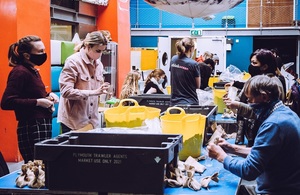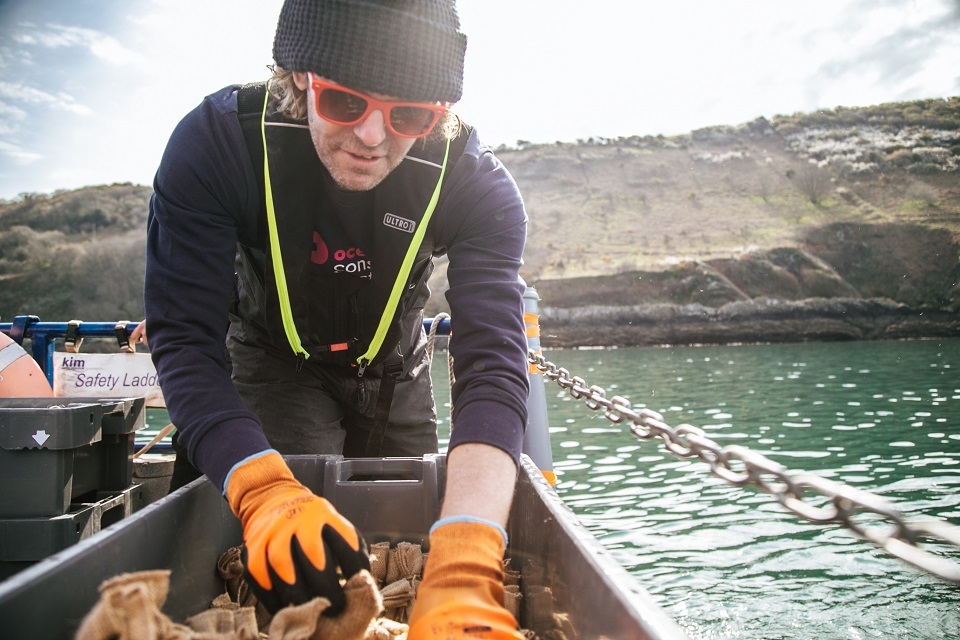Solent’s underwater meadows get a boost
20,000 seagrass seed bags to help restore Solent seabed for people and nature

Volunteers packing seagrass seed bags; Photo: Ocean Conversation Trust
England’s largest seagrass planting project will begin planting in its new restoration site in the Solent this week.
It is part of the 4-year (LIFE Recreation ReMEDIES) project being led by Natural England to help protect and restore the marine environment. The seagrass planting is being carried out by the project’s restoration lead, the Ocean Conservation Trust (OCT).
At least 44% of the UK’s seagrass has been lost since 1936*, but seagrass meadows provide homes for juvenile fish and protected creatures like seahorses and stalked jellyfish. They also play an integral role in stabilising the seabed, cleaning the surrounding seawater and capturing and storing significant amounts of carbon.
The project’s new seagrass restoration site is west of the Beaulieu River mouth, next to the North Solent National Nature Reserve shoreline. The OCT is preparing to carry out one hectare of planting there this week. Around 20,000 biodegradable hessian bags of seed are being packed by Natural England staff and by volunteers at the National Marine Aquarium in Plymouth, North Solent National Nature Reserve, University of Portsmouth, and National Oceanography Centre in Southampton. The bags will be taken out onto the water by barge and dropped down long pipes to land on the seabed.
Fiona Crouch, Natural England Project Manager for ReMEDIES, said:
Seagrass meadows are an important but threatened habitat. Restoring them means restoring the benefits they bring to people and nature – vital homes for wildlife, enhanced water quality, carbon storage, and so much more.
We’re very proud of our partners, funders, and the many volunteers who have given their time to pack seed bags.
Mark Parry, Development Officer at the Ocean Conservation Trust, said:
After the success of our previous planting efforts in Plymouth Sound National Marine Park, we are excited to be getting underway in the Solent. These events are only made possible by the hard work of our partners in the LIFE ReMEDIES Project and the hundreds of volunteers who are willing to dedicate their time to help restore such an important habitat.
Seagrass is delicate and can be damaged by activities such as the anchoring, mooring, and launching of leisure boats, as well as other shore and water-based activities. That’s why, in addition to planting new seagrass meadows, ReMEDIES is working to protect existing beds by helping recreational users to reduce impacts on these sensitive habitats. This has involved trialling and installing Advanced Mooring Systems (AMS) at popular boating locations including the area around Yarmouth Harbour on the Isle of Wight. These AMS are specially designed to minimise interaction with the seabed.

The seagrass planting is being carried out by the project’s restoration lead, the Ocean Conservation Trust; Photo: Ocean Conversation Trust
ReMEDIES will also be working with local schools around the Solent to introduce pupils to the importance of seabed habitats, as well as collaborating with other organisations including Hampshire and Isle of Wight Wildlife Trust, World Wildlife Fund, Isle of Wight Estuaries Officer and Project Seagrass. Together, they hope to visit and assess every seagrass bed in the Solent to build a thorough picture of its health and extent so that restoration efforts can have the greatest impact.
Find out more about LIFE Recreation ReMEDIES by following on Twitter, Instagram and Facebook, or visiting www.saveourseabed.co.uk.
Notes for editors
Volunteers will be packing seagrass seed bags at the National Oceanography Centre in Southampton on 15 March, and at the Institute of Marine Science, University of Portsmouth on 16 March (evening), and 17 March (daytime).
Subject to weather, there will be planting in the Solent on the morning of Friday 18 March.
Media are welcome to attend packing and/or planting and interview representatives from Natural England and Ocean Conservation Trust.
Please note: Media will not be able to accompany the planting team on the barge but can film/photograph the barge being loaded from Portsmouth International Port (from approximately 7am) and setting off. Please let us know by Thursday 17 March if you would like to attend so we can arrange your security clearance through the port.
Images and footage from the seagrass planting in Plymouth Sound in April 2021 and November 2021 is also available.
*Research by Alix Green, published in Frontiers in Plant Science journal, March 2021 https://www.frontiersin.org/articles/10.3389/fpls.2021.629962/full.
LIFE Recreation ReMEDIES
LIFE Recreation ReMEDIES is a £2.5 million, 4-year marine conservation project to Save Our Seabed at 5 Special Areas of Conservation along England’s south coast, through seagrass restoration, education and innovation. It is funded by the LIFE programme and led by Natural England in partnership with Marine Conservation Society, Ocean Conservation Trust, Plymouth City Council/Tamar Estuaries Consultative Forum and Royal Yachting Association.
Natural England
Natural England is the government’s adviser for the natural environment in England, helping to protect England’s nature and landscapes for people to enjoy and for the services they provide.
Ocean Conservation Trust
The Ocean Conservation Trust is an Ocean conservation charity that focuses on 2 key areas: habitat restoration and behaviour change. Following a conservation pathway that has been proven to work, the charity’s approach puts people at the centre, working hard to create meaningful connections between people and the Ocean as the first step to inspiring long-term behaviour change. This is done in tandem with more traditional conservation work surrounding the monitoring and restoration of crucial Ocean habitats, with a particular focus on seagrasses.
Royal Yachting Association (RYA)
The RYA is the national body for dinghy, yacht and motor cruising, all forms of sail racing, RIBs and sports boats, windsurfing and personal watercraft and a leading representative for inland waterways cruising.
The Green Blue is the joint environment programme created by British Marine and the RYA. It was set up to encourage everyone who enjoys getting out on the water or whose livelihood depends on it, to do so as sustainably as possible.
Marine Conservation Society
The Marine Conservation Society is the UK’s leading charity for the protection of our seas, shores and wildlife.
Plymouth City Council/Tamar Estuaries Consultative Forum
Plymouth City Council is a unitary authority and has hosted Tamar Estuaries Consultative Forum since it was first established in the early 1990s. It has a vision for Plymouth to be Britain’s Ocean City and one of Europe’s most vibrant waterfront cities which is sustainable and cares about the environment and is currently working towards creating Britain’s first National Marine Park.
The Tamar Estuaries Consultative Forum (TECF) is a collaborative partnership bringing together the key authorities responsible for the management of the tidal waters of Plymouth Sound and Estuaries European Marine Site. Under the chair of the Queen’s Harbour Master, members consist of 5 local authorities, 4 harbour authorities, Natural England, Environment Agency, Marine Management Organisation, Duchy of Cornwall and both Devon and Severn, and Cornwall Inshore Fisheries and Conservation Authorities.